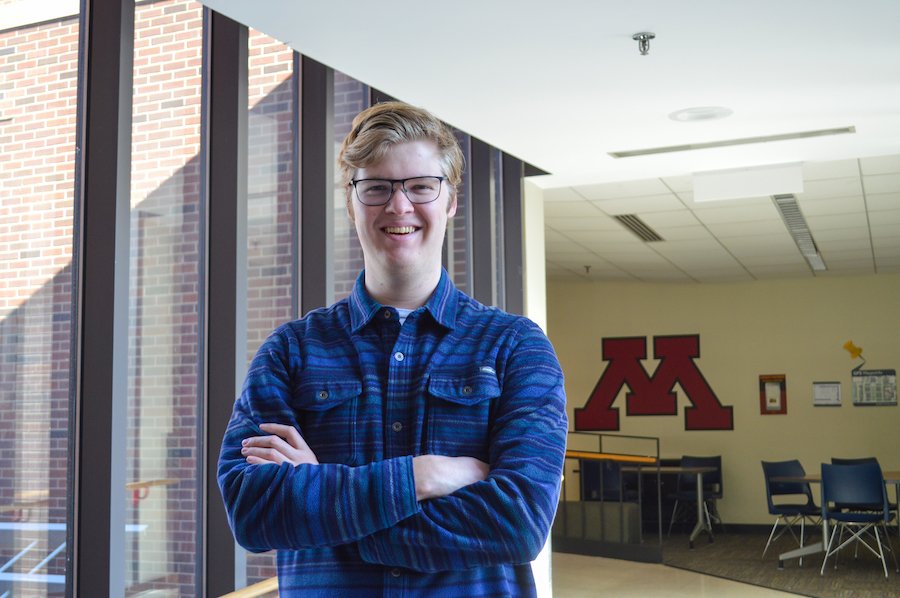Marching band and medical devices are instrumental in senior Matthew Brown's CSE journey

Mechanical engineering senior well-prepared for a career in industry after graduation
May 10, 2023
Four years ago, Matthew Brown made the leap from his hometown of Denver, Colo., to the University of Minnesota College of Science and Engineering. He came for two reasons—Minneapolis’ rich landscape of medical device companies and the University’s nationally renowned marching band.
Brown, a recipient of the Robert E. and Elaine S. Larson Scholarship, originally began as a biomedical engineering major but switched gears to mechanical engineering after his first year to get a broader education in mechanical design. He plays the mellophone (the marching band equivalent of the French horn) and slid easily into the ranks of the University of Minnesota Marching Band, nearly 40 percent of which is made up of CSE students. Now, he’s gearing up for graduation in May with a wide array of possibilities ahead.
In this Q&A, Brown discusses his aspirations in medical device engineering, his time in marching band, and how his CSE experiences have given him confidence for his future career.
What kickstarted your interest in engineering and medical devices?
I knew I wanted to go into engineering in high school. I liked the idea of using creativity and problem-solving to do something useful. As for medical devices, that’s a bit more of a personal story for me. I have a twin sister named Hannah, and she has severe cerebral palsy and depends on a wheelchair for motion. She has a spoken vocabulary of seven words. I've grown up seeing her survive, and even thrive, because of the engineers designing, building, and testing machines that have helped improve the quality of her life. I found that emotional connection really empowering for me, just being able to make a difference while doing something I’m passionate about.
What are a few highlights from your University of Minnesota experience?
I’ve talked about my time in the U of M Marching Band in just about every single job interview I've ever had. Nearly 40% of the marching band is in CSE, and I've found it really helpful knowing that I'm not the only one crazy enough to take on a 10-30 hour a week time commitment in the fall and do engineering on top of that. It has taught me just as much as the engineering side of my college experience has and has shown me that I can balance heavy time commitments while still finding time to do what I'm passionate about.
Another highlight has been some of the hands-on work I've been able to do in my major in my design and manufacturing labs and capstone design projects. I like getting to learn what it's like to take everything that I've learned freshman and sophomore year and see how I can use that to actually build something tangible.
You’re also involved in the Engineering World Health student group. Tell me more about your experiences with that.
Engineering World Health is a biomedical engineering student group, not just for biomedical engineering majors, but interdisciplinary across engineering and science and public health. One of the things I've been really proud of working with EWH is my participation in the national design competitions. When I joined in January 2020, I started working on the motors of a low-cost, prototype ventilator device. That was the first real experience I had with engineering using something I learned in the classroom, which was cool.
The past two years, I’ve been a team lead, which has been a shift for me going from the smaller picture engineering mindset to thinking bigger picture. I've been the lead for a low-cost IV pump project, and this year we're putting the finishing touches on a low-cost steam sterilizer and parameter tester. I found that all to be really rewarding. I’m not necessarily the most outspoken person at times, but I firmly believe you don’t necessarily have to be the loudest or the boldest in the room in order to be an effective engineering leader.
How will your experiences in CSE help you in your future career?
My college experiences have shown me that I can work well and communicate with others effectively. It can definitely be hard at times when you’ve got four or five classes all on top of each other, and projects in each one, and you have to switch back and forth between solving heat transfer problems and designing mechanisms to do things. But overall, it has helped me understand that I can do more than I thought I could.
Interview by Olivia Hultgren
If you’d like to support students and programs in the University of Minnesota College of Science and Engineering, visit our CSE Giving website.
